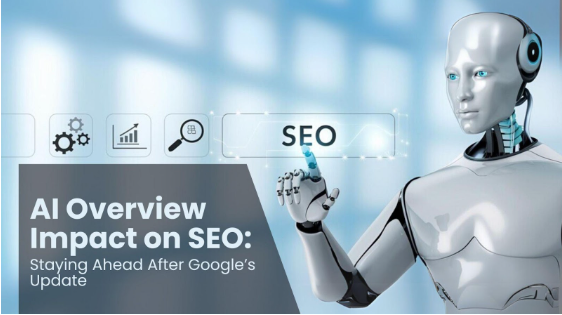AI is rewriting the rules of SEO. From content creation to search engine algorithms, it’s changing how we plan, write and optimize. Google’s recent March 2024 Core Update made it even clearer. The focus is now on helpful, people-first content. Gemini and other AI models are driving smarter, more refined search experiences.
For marketers and SEO pros, this isn’t just a trend. It’s a shift. According to Statista, over 80 percent of digital marketers already use AI tools in their strategies. That number will only grow.
Staying visible in search results now demands more than keywords and backlinks. It calls for a new mindset. Navigating SEO in the age of AI means staying agile, informed and ready to adapt as the rules evolve.
How Google’s AI-Powered Algorithms Are Changing SEO
Google isn’t just using AI behind the scenes. It’s baking it directly into how search works. Tools like the Search Generative Experience (SGE) are changing what users see and how they engage. Instead of simple blue links, people now get AI-curated answers, snapshots and follow-up suggestions.
SpamBrain and the Helpful Content Updates are filtering out low-value pages more effectively. The algorithm now rewards content that feels human, useful and experience-driven. This is where EEAT — expertise, experience, authoritativeness and trust — comes in. Google is using AI to validate these signals more precisely.
The old SEO game of stuffing keywords is gone. What matters today is semantic SEO and real search intent. Google is ranking content based on relevance, context and how well it answers a user’s query.
If you’re building your ultimate SEO checklist, start here. Focus on topics people care about, structure them clearly and deliver answers that AI can understand and rank. This is what AI-driven ranking looks like in action.
Impact of AI on SEO Strategies and Content Creation
AI is changing the way we approach SEO from the ground up. Tools like ChatGPT, Gemini and Jasper are helping marketers brainstorm faster, outline topics and even draft full articles. These AI content tools can save hours in planning and writing. Predictive search analysis shows what users might search for next. This gives brands an advantage in targeting new queries.
Platforms like Surfer and Clearscope go a step further. They analyze top-performing content and offer real-time suggestions for optimization. This level of SEO automation is powerful, but there’s a catch.
AI can’t replace real expertise. Left unchecked, it may churn out bland or duplicate content that won’t perform. The solution is a human-AI collaboration in SEO. Let machines assist, but keep the strategy and final edits human. The best results come from combining speed with storytelling. That balance is what makes content stand out in a crowded search space.
Technical SEO & AI: What’s New?
Behind the scenes, AI is transforming technical SEO too. Google now uses smarter signals to decide what gets indexed and what gets ignored. It’s not just about crawling pages. It’s about understanding them.
AI-powered tools can manage crawl budgets more efficiently and flag issues before rankings drop. They also assess Core Web Vitals at scale, focusing on load time, interactivity and visual stability. These metrics matter more than ever.
Structured data is no longer optional. It helps AI understand your content. Mobile-first design and fast site speed are also non-negotiables in maintaining SEO site health.
This is where modern SEO services come in. They blend human technical expertise with AI insights to ensure your site checks all the boxes. When you optimize with technical SEO and AI working together, you stay a step ahead in the search game. These smarter systems look for intent, context and clarity — not just code.
Staying Ahead: SEO Best Practices in the Age of AI
To stay competitive, SEO strategies need a smarter, more agile approach. It’s no longer about ranking for every keyword. It’s about creating value that meets intent and builds trust. That starts with experience-led content. Google’s EEAT principles reward pages that show real expertise and insight.
AI tools are great for SERP analysis and content suggestions. But don’t rely on them blindly. Always review outputs manually. Context and nuance still matter.
Outdated content can quietly hurt your rankings. Regular audits and content refreshes should be part of your routine. Also, explore new formats. Blogs are great, but adding videos, visual guides or carousels helps capture more visibility through AI-driven search features.
A future-proof SEO strategy also means aligning with trusted experts. A NYC SEO agency combines creative ideas with AI tools. This helps brands improve their search visibility in tough markets.
Quick checklist to stay ahead:
- Focus on helpful, user-first content
- Use AI for insights, not shortcuts
- Refresh older posts regularly
- Prioritize mobile speed and UX
- Experiment with diverse content formats
AI-proof content is possible. You just need the right balance of innovation, expertise and consistency to get there.
Wrapping up,
AI is reshaping the future of search, and SEO is no longer a one-size-fits-all game. To stay relevant, brands need to adapt, audit often and use AI tools with clarity and purpose.
Working with an SEO company in the USA, like Icecube Digital, can help you manage these changes. They focus on getting results. This support can give you confidence. Their team understands both the technical and creative side of SEO, making them a trusted partner for long-term growth. So, don’t wait, and contact them!



